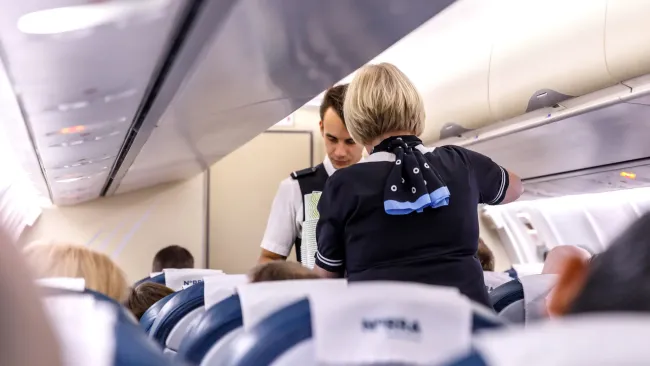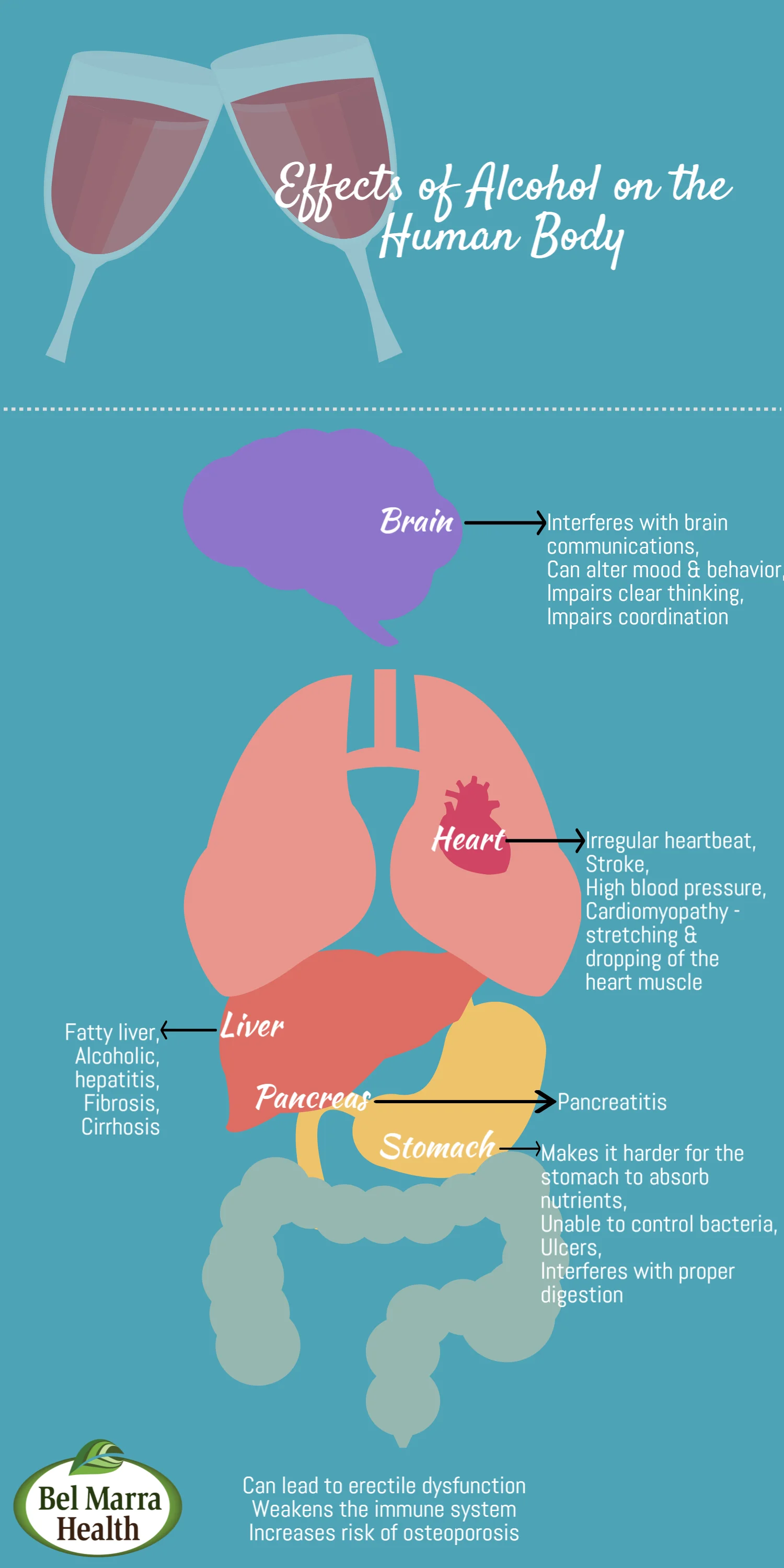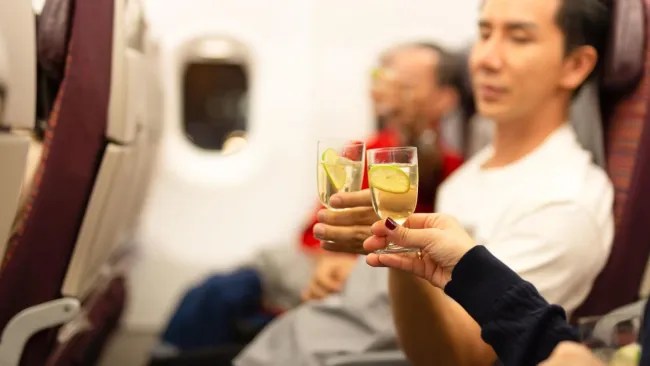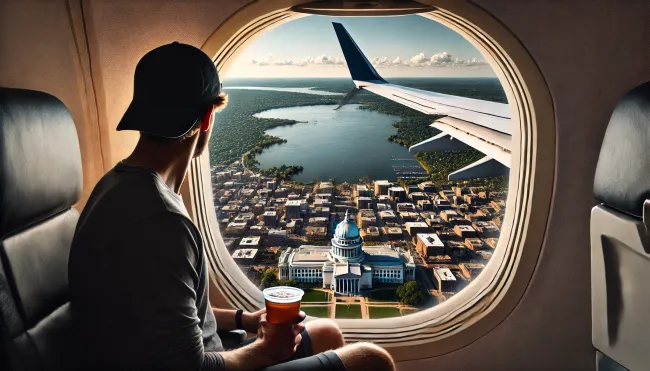If you’ve ever had a drink on a flight, you might have noticed that you feel the effects of alcohol more quickly than usual. This common experience has led to the widespread belief that you get drunker on an airplane than you do on the ground. But is this really true? Are the effects of alcohol actually amplified at 35,000 feet, or is it just a myth? In this article, we’ll explore the science behind alcohol consumption on airplanes and discover what really happens when you drink at high altitudes.

Flight attendants serving passengers on a flight. Photo from DepositPhotos, courtesy of Popular Science.

The Science of Alcohol Absorption at High Altitudes
The sensation of getting drunker on a plane is often attributed to changes in cabin pressure and altitude. Airplanes are pressurized to an equivalent of 6,000 to 8,000 feet above sea level, which is significantly higher than most people are accustomed to. For context, the average elevation where humans live is about 194 meters, or approximately 636 feet, above sea level. This makes airplane cabin conditions quite different from typical ground-level experiences.
At these altitudes, the air pressure is lower, and oxygen levels are reduced. This can lead to hypoxia, a condition where the body’s tissues don't get enough oxygen, which can enhance feelings of lightheadedness and, in some cases, make you feel the effects of alcohol more intensely.
An interesting parallel can be drawn with experiences in cities at high altitudes, such as Denver, which is situated at about 5,280 feet above sea level. People often report feeling drunker faster in such environments due to the lower oxygen levels. However, similar to being on an airplane, the actual metabolic absorption of alcohol into the bloodstream isn’t directly affected by the altitude or reduced oxygen. According to a study by the Aerospace Medical Association, while lower oxygen levels can contribute to a sense of dizziness and light-headedness, they do not change how alcohol is metabolized by the liver. This means that the body processes alcohol the same way at 35,000 feet as it does at sea level, but the symptoms of intoxication might feel more pronounced due to the reduced oxygen environment.

Picture of the Denver skyline. R0uge, CC BY-SA 4.0 https://creativecommons.org/licenses/by-sa/4.0, via Wikimedia Commons
Dehydration and Alcohol: A Potent Combination
Another factor that contributes to the feeling of getting drunker on a plane is dehydration. Airplane cabins are notoriously dry environments, with humidity levels often dropping below 20%. For comparison, the average indoor humidity is around 40-60%. This dry air can lead to dehydration, especially when drinking alcohol, which is a diuretic and can further dehydrate the body. Dehydration can exacerbate the effects of alcohol, making you feel more intoxicated than you might otherwise.
A study published in the Journal of Clinical Medicine found that dehydration can enhance the perception of alcohol’s effects, such as dizziness, headache, and impaired cognitive function. This might explain why a single glass of wine on a flight can feel equivalent to multiple drinks on the ground.
The Psychological Impact: Expectations vs. Reality
There is also a psychological component to consider. The expectation of feeling drunker on a plane can lead to a self-fulfilling prophecy. If you believe that you will get more intoxicated, your brain might interpret the normal effects of alcohol as being more intense. This phenomenon, known as the placebo effect, has been well-documented in various contexts, including alcohol consumption.
In an article published in Alcohol Research: Current Reviews, researchers found that expectations significantly influence how people experience the effects of alcohol. When passengers board a plane and expect that they will feel the alcohol more, they might be more attuned to sensations of lightheadedness or intoxication, even if those feelings are not actually more intense.
Practical Tips for Drinking on a Plane
While it’s clear that drinking on a plane can feel different than drinking on the ground, it’s important to drink responsibly, especially in such a unique environment. Here are a few tips to consider:
- Stay Hydrated: Drink plenty of water before, during, and after your flight. This will help counteract the dehydrating effects of both alcohol and the dry cabin air.
- Limit Your Alcohol Intake: Since the effects of alcohol can feel more intense, it’s wise to consume less than you might normally drink. Stick to one or two drinks, especially on long-haul flights.
- Eat Before You Drink: Having food in your stomach can slow the absorption of alcohol and help mitigate its effects. Opt for a meal rich in protein and complex carbohydrates.
- Listen to Your Body: Pay attention to how you’re feeling. If you start to feel the effects of alcohol more strongly than usual, it might be a good idea to stop drinking and focus on hydration instead.

People having a "cheers" on a passenger plane. Courtesy of Aol, downloaded August 27, 2024.
Conclusion
So, do you really get drunker on an airplane? The answer is nuanced. While the actual metabolic process of alcohol remains unchanged, the unique conditions of an airplane—lower cabin pressure, reduced oxygen levels, dehydration, and psychological expectations—can enhance the perception of intoxication. The next time you’re flying and considering a drink, remember to take these factors into account. Enjoy your drink, but do so responsibly, and stay hydrated to ensure a comfortable and safe flight.
Article Sources
Aerospace Medical Association. (n.d.). The effects of hypoxia and dehydration on alcohol consumption. Retrieved from Aerospace Medical Association.
Barry, R. G. (1997). Hypsographic demography: The distribution of human population by altitude. Retrieved from ResearchGate.
Jones, L., & Anderson, P. (2019). The Influence of Expectations on Alcohol Consumption. Alcohol Research: Current Reviews, 40(3), 245-257.
Smith, J. (2022). Dehydration and Alcohol: A Double-Edged Sword in the Sky. Journal of Clinical Medicine, 11(4), 567-573.



